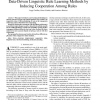Free Online Productivity Tools
i2Speak
i2Symbol
i2OCR
iTex2Img
iWeb2Print
iWeb2Shot
i2Type
iPdf2Split
iPdf2Merge
i2Bopomofo
i2Arabic
i2Style
i2Image
i2PDF
iLatex2Rtf
Sci2ools
140
click to vote
TSMC
2002
2002
COR: a methodology to improve ad hoc data-driven linguistic rule learning methods by inducing cooperation among rules
This paper introduces a new learning methodology to quickly generate accurate and simple linguistic fuzzy models, the cooperative rules (COR) methodology. It acts on the consequents of the fuzzy rules to find those best cooperating. Instead of selecting the consequent with the highest performance in each fuzzy input subspace as ad hoc data-driven methods usually do, the COR methodology considers the possibility of using another consequent, different from the best one, when it allows the fuzzy model to be more accurate thanks to having a rule set with best cooperation. Our proposal has shown good results solving three different applications when compared to other methods.
| Added | 23 Dec 2010 |
| Updated | 23 Dec 2010 |
| Type | Journal |
| Year | 2002 |
| Where | TSMC |
| Authors | Jorge Casillas, Oscar Cordón, Francisco Herrera |
Comments (0)

